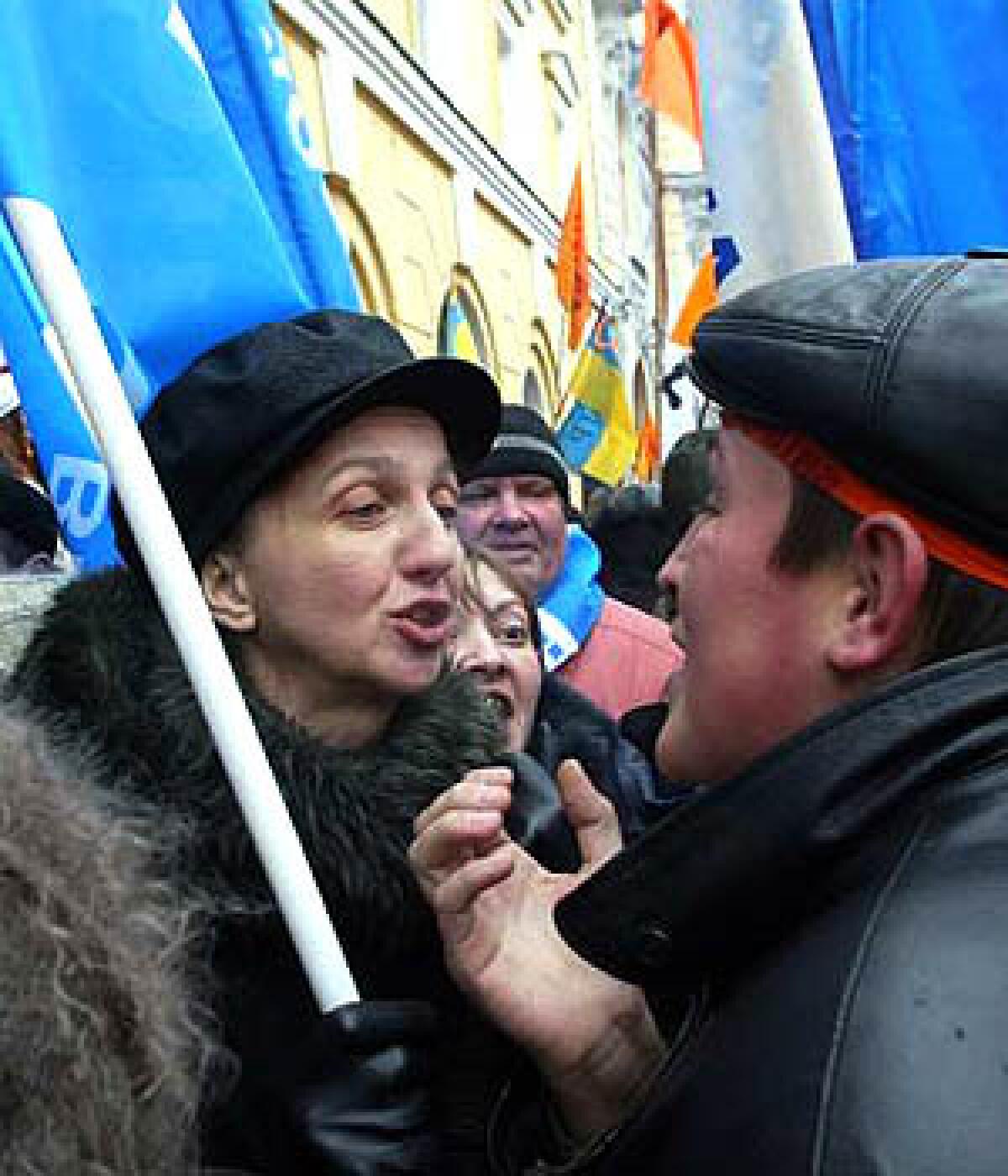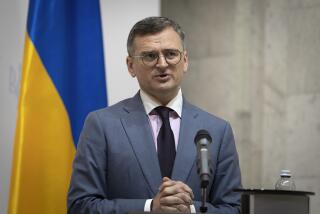Ukraine Opposition Pull Out of Talks

- Share via
KIEV, Ukraine — An aide for Ukraine’s opposition leader said today their negotiators have withdrawn from talks on resolving the disputed national election, deepening a political crisis and further eroding Prime Minister Viktor Yanukovich’s bid for recognition as president.
Also today, the Supreme Court heard more appeals from opposition leader Viktor Yushchenko to overturn the results from the Nov. 21 vote, which many have described as fraudulent.
Oleksander Zinchenko, a Yushchenko aide, told reporters: “We hereby announce that we have pulled out of the negotiating process,” according to news reports.
Opposition deputies were believed to be seeking to oust Yanukovich from his prime minister post.
In a show of support, Zinchenko also called for demonstrators to resume massing around the Parliament building. Earlier, a limited number of protesters briefly tried to push their way into the building, but were rebuffed.
On Monday, outgoing President Leonid D. Kuchma endorsed a proposal for new balloting to resolve the country’s political crisis.
By official count, the prime minister narrowly defeated Yushchenko, but his inauguration is on hold while the court considers the challenge. Observers say it could be several days before the court issues a ruling.
Supporters of the pro-Western Yushchenko, who claims to be the legitimate winner, continued to mount massive demonstrations in Kiev. Television networks that until a few days ago overwhelmingly supported the prime minister broadcast the proceedings live, allowing the allegations to reach parts of the country that normally hear little but pro-government news.
Yielding political ground, Yanukovich said he could accept new balloting in two eastern regions where critics say his vote count was inflated by fraud, including massive abuse of absentee ballots.
“If there is proof of cheating, that something illegal occurred there and if there is no doubt among experts, I will agree with such a decision,” he said.
Foreign observers have charged that absentee voting allowed Yanukovich supporters to travel by bus to cast multiple ballots in many districts — and that some small polling places recorded up to 50% more ballots than registered voters.
The Central Election Commission said Yanukovich won 49.5% to 46.6%, a margin of 871,402 votes.
In the court hearing, Yushchenko’s legal team focused on eight southern and eastern regions that accounted for 15.35 million votes. The court gave Yanukovich’s legal team until today to respond to the allegations of fraud.
In addition to allegations that Yanukovich’s campaign inflated absentee ballots, the Yushchenko camp alleges that the prime minister sought to secure a victory through intimidation of election officials and observers, inaccurate voter lists that included dead people and excluded opposition supporters, coercion of students and public sector workers, and the destruction of some pro-Yushchenko ballots.
The incumbent president and the two presidential candidates are pushing differing proposals for a new election.
Yushchenko has called for a December repeat of the presidential runoff vote, but not the entire electoral process, which began with a field of 24 candidates in a first round of voting Oct. 31.
Yanukovich has reluctantly said there could be a revote in certain regions. That seemed calculated to avoid an even worse outcome for him: a potential Supreme Court ruling completely invalidating the vote in those areas, which could throw the election to Yushchenko and make him president. Observers consider such a result unlikely.
Kuchma, on the other hand, appeared to favor an entirely new election, which would open the door to new candidates in an initial vote about three months from now, followed by another runoff if no one received more than 50% of the vote.
“If we really want to preserve peace and cooperation in Ukraine and build a democratic society based on the rule of law let us hold a new election,” said Kuchma, who insisted that he would not be a candidate. “This is the only more or less legal way.”
Kuchma’s reference to a “more or less” legal solution reflected how the dispute has already moved onto murky legal ground. Observers say that a peaceful solution will probably require a Supreme Court ruling that settles the current vote count and the status of the Nov. 21 election. Parliamentary action might also be needed to set up rules for a repeat of the runoff or a new election. Any new election would have to get at least Kuchma’s approval.
Times staff writer Paul Richter in Washington and Daryl Strickland in Los Angeles contributed to this report.
More to Read
Sign up for Essential California
The most important California stories and recommendations in your inbox every morning.
You may occasionally receive promotional content from the Los Angeles Times.










